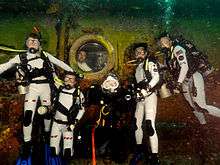Justin Brown (aquanaut)
| Justin Brown | |
|---|---|
| Born | Streator, Illinois |
| Nationality | American |
| Alma mater | Florida State University |
| Occupation | Aquanaut |
Justin Brown is an American professional aquanaut with the University of North Carolina Wilmington (UNCW). He serves as a habitat technician at Aquarius Reef Base, the world's only undersea research laboratory.[1][2]
Early life and education
Brown was born in Streator, Illinois, but moved to Central Florida while in middle school.[3] He received a degree in criminology from Florida State University (FSU), where he also minored in biology. After a two-week internship at Aquarius Reef Base through FSU's Underwater Crime Scene Investigation dive classes in 2006, Brown interned for an entire semester at Aquarius and was then offered a permanent position. He eventually became a senior member of the dive team.[1][3]
Aquarius

Talacek serves as a habitat technician at Aquarius Reef Base for the National Undersea Research Center (NURC), maintaining the daily operations of Aquarius.[1] In a July 2011 blog entry, Brown commented, "When the idea of what we do sets in I get the typical responses of 'that's the coolest job ever' or 'wow, I've never knew stuff like that existed.'"[4]
As a habitat technician during Aquarius missions, Brown's responsibilities include habitat operations and maintenance, including carrying out dives to maintain the exterior of the habitat. He also monitors life support systems, communicates with the crew on shore, and acts as a divemaster for the scientists aboard Aquarius.[5] In August 2009, during the investigation of the death of Aquarius aquanaut Dewey Smith, Brown served as safety observer in an underwater test in which the hydraulic hammer in use near Smith at the time of his fatal accident was again used underwater in the vicinity of an Inspiration closed circuit rebreather (CCR) similar to the one Smith had been using.[6]
In June 2012, Brown took part as a habitat technician in the NASA Extreme Environment Mission Operations 16 (NEEMO 16) mission, one of a series of NASA-NOAA missions which use Aquarius as an analog environment for space exploration. The NEEMO 16 crew lived and worked underwater aboard Aquarius for twelve days, simulating techniques to be used by astronauts on a future mission to an asteroid.[7][8][9]
Personal life
Brown lives in Homestead, Florida with his girlfriend and their goldendoodle.[1] He has volunteered as a coach with the Coral Shores High School wrestling team and has run 5k, half marathon, triathlon and adventure races.[3]
References
- 1 2 3 4 Brown, Justin (June 2012). "Profiles - NOAA's Aquarius Reef Base - Justin Brown". University of North Carolina Wilmington. Retrieved July 18, 2012.
- ↑ "The team - NOAA's Aquarius Reef Base". University of North Carolina Wilmington. 2012. Retrieved July 18, 2012.
- 1 2 3 "Profiles - NOAA's Aquarius Reef Base - Justin Brown". University of North Carolina Wilmington. August 2010. Retrieved July 18, 2012.
- ↑ Brown, Justin (July 2011). "Challenge to All - Mission Blog". National Undersea Research Center. Retrieved July 18, 2012.
- ↑ Prager, Ellen (October 2008). "Being an Aquarius Habitat Technician". NURC. Retrieved March 20, 2012.
- ↑ "External Review Board Report of Findings and Recommendations" (PDF). American Academy of Underwater Sciences. August 27, 2009. p. 42 (Appendix G). Retrieved July 16, 2012.
- ↑ The NEEMO Mission Management and Topside Support Team (June 12, 2012). "NEEMO 16 Mission Day 2 - Status Report" (PDF). National Aeronautics and Space Administration. Retrieved July 18, 2012.
- ↑ Boyle, Alan (June 12, 2012). "NASA goes underwater (and goes social) to get set for asteroid mission". NBCNews.com. Retrieved July 18, 2012.
- ↑ "Finding NEEMO: US aquanauts train for asteroid mission". The Hindu. June 26, 2012. Retrieved July 18, 2012.